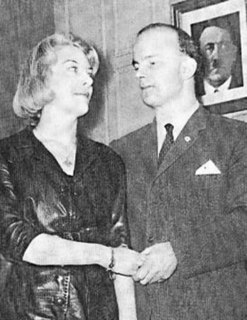A Quote by Otto Weininger
Man is alone in the world, in tremendous eternal isolation. He has no object outside himself; lives for nothing else; he is far removed from being the slave of his wishes, of his abilities, of his necessities; he stands far above social ethics; he is alone. Thus he becomes one and all.
Related Quotes
In the absence of government each man learns to think, to act for himself, without counting on the support of an outside force which, however vigilant one supposes it to be, can never answer all social needs. Man, thus accustomed to seek his well-being only through his own efforts, raises himself in his own opinion as he does in the opinion of others; his soul becomes larger and stronger at the same time.
The young man who addresses himself in stern earnest to organizing his life-his habits, his associations, his reading, his study, his work-stands far more chance of rising to a position affording him opportunity to exercise his organizing abilities than the fellow who dawdles along without chart or compass, without plan or purpose, without self-improvement and self-discipline.
There exists an infinite, eternal Being, subsisting of himself, who is one without being alone; for he finds in his own essence relations whence, with the necessary movement of his life, results the absolute plenitude of his perfection and his happiness. A Being unique and complete, God suffices to himself.
By Liberty I understand the Power which every Man has over his own Actions, and his Right to enjoy the Fruits of his Labour, Art, and Industry, as far as by it he hurts not the Society, or any Members of it, by taking from any Member, or by hindering him from enjoying what he himself enjoys. The Fruits of a Man's honest Industry are the just Rewards of it, ascertained to him by natural and eternal Equity, as is his Title to use them in the Manner which he thinks fit: And thus, with the above Limitations, every Man is sole Lord and Arbitrer of his own private Actions and Property.
If God wishes to be born as man and to unite mankind in the fellowship of the Holy Ghost, He suffers the terrible torment of having to bear the world in its reality. It is a crux; indeed, He Himself is His own cross. The world is God's suffering, and every individual human being who wishes even to approach his own wholeness knows very well that this means bearing his own cross. But the eternal promise for him who bears his own cross is the Paraclete.
Our reverence for the nobility of manhood will not be lessened by the knowledge that man is in substance and in structure, one with the brutes; for he alone possesses the marvellous endowment of intelligible and rational speech whereby he has slowly accumulated and organized the experience which is almost wholly lost with the cessation of individual life in other animals; so that he now stands raised above it as on a mountain-top, far above the level of his humble fellows, and transfigured from his grosser nature by reflecting, here and there, a ray from the infinite source of truth.
Some souls think that the Holy Spirit is very far away, far, far, up above. Actually he is, we might say, the divine Person who is most closely present to the creature. He accompanies him everywhere. He penetrates him with himself. He calls him, he protects him. He makes of him his living temple. He defends him. He helps him. He guards him from all his enemies. He is closer to him than his own soul. All the good a soul accomplishes, it carries out under his inspiration, in his light, by his grace and his help.
All that is limited by form, semblance, sound, color is called object. Among them all, man alone is more than an object. Though, like objects, he has form and semblance, He is not limited to form. He is more. He can attain to formlessness. When he is beyond form and semblance, beyond "this" and "that," where is the comparison with another object? Where is the conflict? What can stand in his way? He will rest in his eternal place which is no-place. He will be hidden in his own unfathomable secret. His nature sinks to its root in the One. His vitality, his power hide in secret Tao.
Economic man and the Calvinist Christian sing to each other like voices in a fugue. The Calvinist stands alone before an almost merciless God; no human agency can help him; his church is a means to political and social organization rather than a bridge to deity, for no priest can have greater knowledge of the divine way than he himself; no friend can console him - in fact, he should distrust all men; in the same fashion, Economic Man faces a merciless world alone and unaided, his hand against every other's.
The Christian religion, outwardly and even in intention humble, does, without meaning it, teach man to regard himself as the most important of all created things. Man surveys the starry heavens and hears with his ears of the plurality of worlds; yet his religion bids him believe that his alone out of these innumerable spheres is the object of his master's love and sacrifice.
At present, man applies to nature but half his force. He works on the world with his understanding alone. He lives in it, and masters it by a penny-wisdom; and he that works most in it, is but a half-man, and whilst his arms are strong and his digestion good, his mind is imbruted, and he is a selfish savage.
Life, as a part, is interwoven with the life of the whole, not only present, but past and future, for while men come and go the folk lives on, continuous, eternal, providing its members perform their duty to it. Thus, in identifying himself with his folk man prolongs himself through the multiplicity of his ancestors and his descendants, and thereby attains immortality.
Take the happiest man, the one most envied by the world, and in nine cases out of ten his inmost consciousness is one of failure. Either his ideals in the line of his achievements are pitched far higher than the achievements themselves, or else he has secret ideals of which the world knows nothing, and in regard to which he inwardly knows himself to be found wanting.
When a woman submits to a man, it's the most precious gift she can give. Herself. Unreservedly. The man has to respect and honor that gift above all else. Even if he respects nothing else in the world, he must respect the woman in his care. It's his sworn duty to protect, honor and cherish his submissive. To take care of her and provide a safe haven. Someone who would put his own needs above his woman's is no man.






































